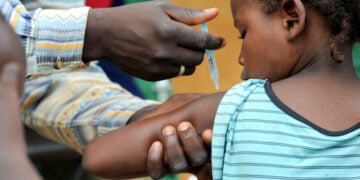The managing director and CEO, Nordica Fertility Centre, Dr. Abayomi Ajayi, has raised the alarm over the rising cases of Polycystic Ovary Syndrome (PCOS) being misdiagnosed or underdiagnosed in the country.
PCOS is a common hormonal condition that affects women of reproductive age. It usually starts during adolescence, but symptoms may fluctuate over time. PCOS can cause hormonal imbalances, excess androgen levels, cysts in the ovaries and irregular periods, usually with a lack of ovulation, thereby making it difficult to become pregnant. It is a leading cause of infertility.
Joining the entire world in making September a significant month for PCOS awareness, Ajayi, at a media chat in Lagos, expressed concern about the growing number of women who remain unaware they are living with the condition due to inadequate healthcare services and poor awareness among both patients and healthcare providers. “Many women who are presently encountering PCOS don’t realize it yet as they battle infertility, weight gain, and other concerns. They might not be getting the answers they need from their doctors. This informs why creating adequate awareness is needed,” he averred.
Speaking on the prevalence rate of the condition, Ajayi said, “About 10 to 15 per cent of women will encounter PCOS. Unfortunately, about 50 per cent to 70 per cent of them will not be diagnosed, so there’s still a lot of misdiagnosis and under-diagnosis going on. Misdiagnosis in the sense that so many people are labelled to be PCOS when they are not, and the real people who have PCOS are not diagnosed most of the time. So it’s important for us to be able to talk about this, ask questions, and be sure that information we’re passing across is the truth.”
On why is there high misdiagnosis, Ajayi said, “mostly because now many people just look at the scan report and say there’s PCOS from the scan alone, but we know that, that might not be totally true.” On how to effectively diagnose the condition, the managing director said the condition can be diagnosed with two out of three symptoms. “The first one being that the woman will have irregular menstrual cycles, usually less than eight or nine a year. Why is this so? Because what we call polycystic ovaries are follicles arrested at different stages of development, which she do not ovulate, and therefore those months where they are arrested and she did not ovulate, she might not see her menses when it is due.
“We know that normal menstrual period should come 20 days plus or minus seven, so 21 days is normal, 35 days is normal. After 35 days, it’s not normal. So most of these women will have menstrual periods, the duration will be more than 35 days, and that’s why they might not have more than eight periods in a year. Now, for the uterus to be healthy, when you are not on any form of contraception, you need to bleed at least four times in a year. The second thing is that because they have higher male hormones, they tend to have the male pattern hair growth, so it’s not unusual for you to see some of them having beards, some of them having hair on their chest, and even in the genital area, some of them will have the male pattern. The female pattern is usually an inverted triangle, the male is the one with the triangular pattern, so you see some of them having this triangular pattern of hair around their genitals.
“Some of them can be hairy generally, and then that’s with the male hormones, that they have excessive male hormones. They might have oily skin and they might have acne. Now, the other thing is that when you do a scan on them, you will see these so-called polycystic ovaries. It’s so-called because they are not really cysts, they are follicles arrested at different stages of development, and therefore, that’s one of the reasons when you give them drugs to ovulate, some of these drugs in some of these follicles just shout hallelujah, and then you have quite a number of them becoming active and getting to want to ovulate. That is also one of the complications that you can have from women who have PCOS,” he explained.
Addressing the million-dollar question: what causes PCOS?, Ajayi said, “Unfortunately, we still don’t know that yet, but we think there is definitely a genetic linkage because it runs in families. We also have been able to see some things that are like the pathology that might lead to PCOS. One of them is that we mentioned higher male hormones. So, this usually results from what we call insulin resistance. Now, this insulin is a hormone that releases sugar or energy in us. So, insulin is the hormone that attracts sugar from our blood into the cells. It’s insulin that drives the sugar into the cells, and that’s why we have energy to be able to do work. Now, if there is resistance, the sugar is not dragged into the blood, and therefore, because the body senses it, the body will tend to produce more insulin. And so, we have what we call, in a state we call hyperinsulinemia, meaning, too much insulin in the body.”
To tackle PCOS leading to infertility, Ajayi said, “The first thing to do with a patient who has infertility, even if you have diagnosed PCOS, is to do a proper evaluation of the infertility, which includes doing the seminar fluid analysis. Next, do a scan and HSG to be sure that the tubes are fitted, and then you do your hormone assessment. When you have done this, then you already know she has polycystic ovaries. When you are sure it’s PCOS, then you can start with just trying to do ovulation induction with drugs. And then hopefully there’s a pregnancy. But when all this doesn’t work, then we have to revert to IVF.”
Sadly, Ajayi asserted that PCOS is a chronic condition and cannot be cured, however, some symptoms can be improved through lifestyle changes, medications and fertility treatments.





